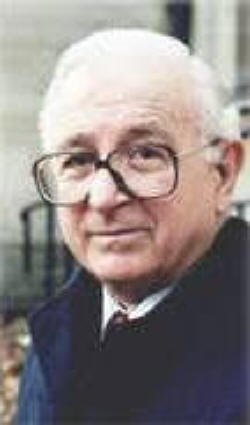

Queer Places:
Eton College, Windsor, Windsor and Maidenhead SL4 6DW
University of Cambridge, 4 Mill Ln, Cambridge CB2 1RZ
Dorothy's, 75 Brompton Rd, London SW3 1DB, UK
 Jeremy
Dacre Fox (May 6, 1927 - May 26, 1999), a barrister, played a key role in bringing the James Hanratty A6 murder case to public attention.
Jeremy
Dacre Fox (May 6, 1927 - May 26, 1999), a barrister, played a key role in bringing the James Hanratty A6 murder case to public attention.
Jeremy Dacre Fox was the son of the headmaster of Sunningdale Boys' Preparatory School, which he attended. He then won a scholarship to Eton, and subscholarship to King's College, Cambridge. His studies were interrupted by army national service, where the shrewdness of his racing tips earned him particular popularity. He was called to the Bar at Lincoln's Inn in 1952, was taken on in chambers at 5, New Square, and worked in Chancery.
In 1955, he met Jean Justice, a Belgian diplomat's son, at Dorothy's, a Knightsbridge gay club. They were near-neighbours in Half Moon Street, Mayfair, and in due course Jean persuaded Jeremy to move in with him. "I did have my doubts at first," he said, "he was rather militantly gay, whereas I liked keeping a low profile." Together, they dined at the best restaurants, took the best seats at the Royal Opera House, and purchased a cottage at Newdigate, near Gatwick. It was there that they had their first brush with publicity. After an unsavoury incident with a rent-boy, the News of the World described their retreat as "a sink of iniquity". Justice revelled in publicity and was thrilled, Fox was mortified. "It was severely embarrassing for my family in the home counties, because the whole world then knew that I was gay. I remember my mother telling me that I'd be an outcast."
After a heavier than usual drinking session on the train to Victoria, they were charged with unruly behaviour. Having engaged one of the most expensive solicitors in the country, they were let off with a fine.
Jeremy was again in trouble, however, when he took a wig and gown from chambers to enable Justice to attend the 1962 Portland spy trial. He had to provide an explanation to the Treasurer of Lincoln's Inn. "By the time the A6 case came along," he remembered, "Jean and I must have been two of the least credible personalities in London." On a whim, Justice attended the committal hearing in the A6 murder, with which James Hanratty was charged. He was initially unable to instil a comparable interest in Fox, who was then engaged on contributions to Halsbury's Laws Of England. Nevertheless, he was drawn in as he and Justice became the first outsiders to appreciate how fabricated the case against Hanratty was. They tracked down Peter Alphon, the enigmatic loner who was the original suspect. They befriended him, took him to the best restaurants and clubs and came to regard him with deepening suspicion. But despite frantic endeavours, they were unable to prevent Hanratty's execution. Fox himself - as, he explained, "a barrister and a member of the establishment" - was loath to believe that justice could miscarry so fundamentally. He only became completely convinced of Alphon's guilt some months later, when the latter confessed to him at the Blue Angel club in Berkeley Square. Fox subsequently prepared a detailed memorandum on the case containing a number of arguments that, 35 years later, the Criminal Cases Review Commission was also to find compelling. Throughout the 1960s, Fox and Justice fought on for posthumous justice for Hanratty. Although generally cast as Tonto to Justice's Lone Ranger, it was Fox who provided huge financial support which enabled the campaigning - along with Hanratty's parents and brother, Michael, and others, notably the journalist Paul Foot, to be so effective. In 1970, Fox again had to explain himself to the Treasurer of Lincoln's Inn after speaking out at a lawyers' dinner, reasserting Hanratty's innocence and rebuking Lord Denning.
He broke with Justice and bought a large house in Charlbury Grove, Ealing, which soon became the scene of wild parties and attracted, according to one police officer, "all the yobs, queers and junkies in West London". In the 1970s he was declared a bankrupt but he remained committed to the Hanratty case.
My published books: